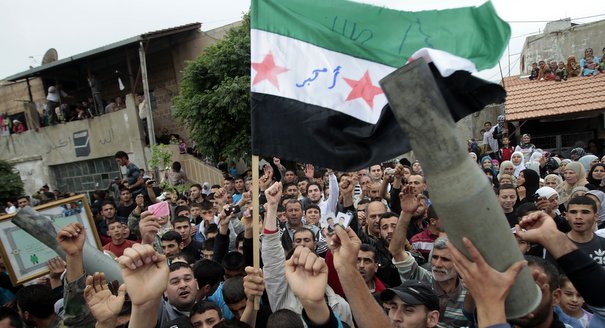A recent offensive by Damascus and the Kurds’ abandonment by Arab allies have left a sense of betrayal.
Wladimir van Wilgenburg
{
"authors": [
"Aron Lund"
],
"type": "commentary",
"blog": "Diwan",
"centerAffiliationAll": "",
"centers": [
"Carnegie Endowment for International Peace"
],
"collections": [],
"englishNewsletterAll": "",
"nonEnglishNewsletterAll": "",
"primaryCenter": "Carnegie Endowment for International Peace",
"programAffiliation": "",
"programs": [],
"projects": [],
"regions": [
"Syria"
],
"topics": []
}
Source: Getty
The Arab Socialist Baath Party has ruled Syria since 1963 and continues to do so after the constitutional changes in spring 2012. The party's role in Syrian politics has of course been affected by the events since 2011, although little has changed on the surface.
A Baath Party congress has not been held since 2005 and it is now several years overdue. But in July 2013, the Baath Party finally organized a meeting of its Central Committee, the leadership body which is tasked with electing ruling Regional Command. This resulted in major personnel changes, with the retirement of powerful figures like Mohammed Said Bukheitan and the vice president Farouq al-Sharaa from the Regional Command. Succeeding Bukheitan as Bashar al-Assad's deputy party secretary, the former branch leader in Aleppo, Hilal Hilal, took charge of the Baath.
To understand more of the changes in and around the Baath Party, I interviewed Sami Moubayed, a Syrian historian and visiting scholar at the Carnegie Middle East Center.
Mr. Moubayed, could you tell us a little bit about how the Baath Party has responded to the uprising of 2011?
Everybody expected the Baath Party's role to erode when the disturbances started in March 2011. Yet contrary to expectations, it was revived.
The Baath was the only party with cadres, money, buildings, periodicals, and manpower. From the regime perspective, it was the only party that could deliver, with its 2.8 million members. The entire officer class and the civil service were Baathists after all. The regime wanted them to realize that if they go, everything will go with them. Only then would they fight, as one body, for regime survival. The regime tapped into the Baath reservoir for support and got plenty of it.
In what way was the Baath Party influence noticeable?
The Adel Safar cabinet, which was brought to power in April 2011, was almost hand-picked by the assistant secretary general of the Baath Party, Mohammad Said Bkheitan. The number of Baathists was increased in the cabinet and they were strongly represented in the National Dialogue Conference, chaired by Farouk al-Shara, in July 2011.
They strongly lobbied against removing the article of the constitution that gave them the status of "leader of state and society." It was only removed in February 2012, after much resistance, but so powerful were the Baathists that they continued to act as if business as usual. They continued to nominate their members for senior jobs, and were rewarded accordingly, and continued to celebrate their events, like the annual anniversary of their 1963 coup on March 8.
So why did the regime feel the need to hold a Central Committee meeting in July this year, and what was the significance of the new leadership appointments?
There was a need for a congress for several reasons. One was to vote for replacements to the handful of officials who were once on the central committee, and were now no longer there. Assef Shawkat, Daoud Rajha, Hasan Turkmani, and Hisham Ikhtyar were all killed in July 2012. Manaf Tlass, Nawaf al-Fares, and Riad Hijab all defected, also in July 2012. Technically, the congress had to happen to fill in their vacancies.
Carnegie does not take institutional positions on public policy issues; the views represented herein are those of the author(s) and do not necessarily reflect the views of Carnegie, its staff, or its trustees.
A recent offensive by Damascus and the Kurds’ abandonment by Arab allies have left a sense of betrayal.
Wladimir van Wilgenburg
The government’s gains in the northwest will have an echo nationally, but will they alter Israeli calculations?

Armenak Tokmajyan
The country’s leadership is increasingly uneasy about multiple challenges from the Levant to the South Caucasus.

Armenak Tokmajyan
Recent leaks made public by Al-Jazeera suggest that this is the case, but the story may be more complicated.
Mohamad Fawaz
The U.S. is trying to force Lebanon and Syria to normalize with Israel, but neither country sees an advantage in this.

Michael Young